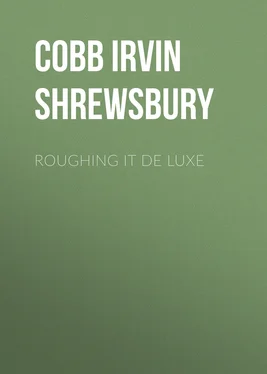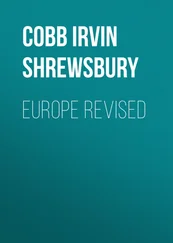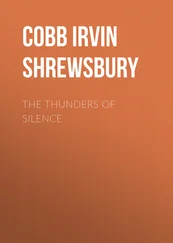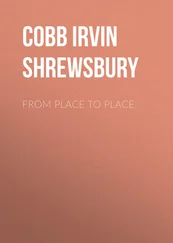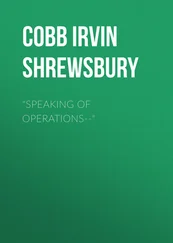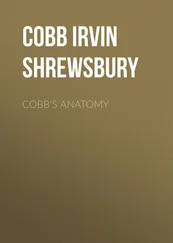Irvin Cobb - Roughing it De Luxe
Здесь есть возможность читать онлайн «Irvin Cobb - Roughing it De Luxe» — ознакомительный отрывок электронной книги совершенно бесплатно, а после прочтения отрывка купить полную версию. В некоторых случаях можно слушать аудио, скачать через торрент в формате fb2 и присутствует краткое содержание. Жанр: Путешествия и география, Юмористические книги, История, foreign_edu, foreign_antique, foreign_prose, foreign_humor, на английском языке. Описание произведения, (предисловие) а так же отзывы посетителей доступны на портале библиотеки ЛибКат.
- Название:Roughing it De Luxe
- Автор:
- Жанр:
- Год:неизвестен
- ISBN:нет данных
- Рейтинг книги:5 / 5. Голосов: 1
-
Избранное:Добавить в избранное
- Отзывы:
-
Ваша оценка:
- 100
- 1
- 2
- 3
- 4
- 5
Roughing it De Luxe: краткое содержание, описание и аннотация
Предлагаем к чтению аннотацию, описание, краткое содержание или предисловие (зависит от того, что написал сам автор книги «Roughing it De Luxe»). Если вы не нашли необходимую информацию о книге — напишите в комментариях, мы постараемся отыскать её.
Roughing it De Luxe — читать онлайн ознакомительный отрывок
Ниже представлен текст книги, разбитый по страницам. Система сохранения места последней прочитанной страницы, позволяет с удобством читать онлайн бесплатно книгу «Roughing it De Luxe», без необходимости каждый раз заново искать на чём Вы остановились. Поставьте закладку, и сможете в любой момент перейти на страницу, на которой закончили чтение.
Интервал:
Закладка:
It is customary for the newly arrived visitor to take a ride along the edge of the cañon—the rim-drive, it is called—with stops at Hopi Point and Mohave Point and Pima Point, and other points where the views are supposed to be particularly good. To do this you get into a smart coach drawn by horses and driven by a competent young man in a khaki uniform. Leaving behind you a clutter of hotel buildings and station buildings, bungalows and tents, you go winding away through a Government forest reserve containing much fine standing timber and plenty more that is not so fine, it being mainly stunted piñon and gnarly desert growths.
Presently the road, which is a fine, wide, macadamized road, skirts out of the trees and threads along the cañon until it comes to a rocky flange that juts far over. You climb out there and, instinctively treading lightly on your tiptoes and breathing in syncopated breaths, you steal across the ledge, going slowly and carefully until you pause finally upon the very eyelashes of eternity and look down into that great inverted muffin-mold of a cañon.
You are at the absolute jumping-off place. There is nothing between you and the undertaker except six-thousand feet, more or less, of dazzling Arizona climate. Below you, beyond you, stretching both ways from you, lie those buried mountains, the eternal herds of the Lord's cattlefold; there are scars upon their sides, like the marks of a mighty branding iron, and in the distance, viewed through the vapor-waves of melting snow, their sides seem to heave up and down like the flanks of panting cattle. Half a mile under you, straight as a man can spit, are gardens of willows and grasses and flowers, looking like tiny green patches, and the tents of a camp looking like scattered playing cards; and there is a plateau down there that appears to be as flat as your hand and is seemingly no larger, but actually is of a size sufficient for the evolutions of a brigade of cavalry.
When you have had your fill of this the guide takes you and leads you—you still stepping lightly to avoid starting anything—to a spot from which he points out to you, riven into the face of a vast perpendicular chasm above a cave like a monstrous door, a tremendous and perfect figure seven—the house number of the Almighty Himself. By this I mean no irreverence. If ever Jehovah chose an earthly abiding-place, surely this place of awful, unutterable majesty would be it. You move a few yards farther along and instantly the seven is gone—the shift of shadow upon the rock wall has wiped it out and obliterated it—but you do not mourn the loss, because there are still upward of a million things for you to look at.
And then, if you have timed wisely the hour of your coming, the sun pretty soon goes down; and as it sinks lower and lower out of titanic crannies come the thickening shades, making new plays and tricks of painted colors upon the walls—purples and reds and golds and blues, ambers and umbers and opals and ochres, yellows and tans and tawnys and browns—and the cañon fills to its very brim with the silence of oncoming night.
You stand there, stricken dumb, your whole being dwarfed yet transfigured; and in the glory of that moment you can even forget the gabble of the lady tourist alongside of you who, after searching her soul for the right words, comes right out and gives the Grand Cañon her cordial indorsement. She pronounces it to be just perfectly lovely! But I said at the outset I was not going to undertake to describe the Grand Cañon—and I'm not. These few remarks were practically jolted out of me and should not be made to count in the total score.
Having seen the cañon—or a little bit of it—from the top, the next thing to do is to go down into it and view it from the sides and the bottom. Most of the visitors follow the Bright Angel Trail which is handily near by and has an assuring name. There are only two ways to do the inside of the Grand Cañon—afoot and on mule-back. El Tovar hotel provides the necessary regalia, if you have not come prepared—divided skirts for the women and leggings for the men, a mule apiece and a guide to every party of six or eight.
At the start there is always a lot of nervous chatter—airy persiflage flies to and fro and much laughing is indulged in. But it has a forced, strained sound, that laughter has; it does not come from the heart, the heart being otherwise engaged for the moment. Down a winding footpath moves the procession, with the guide in front, and behind him in single file his string of pilgrims—all as nervous as cats and some holding to their saddle-pommels with death-grips. Just under the first terrace a halt is made while the official photographer takes a picture; and when you get back he has your finished copy ready for you, so you can see for yourself just how pale and haggard and wall-eyed and how much like a typhoid patient you looked.
The parade moves on. All at once you notice that the person immediately ahead of you has apparently ridden right over the wall of the cañon. A moment ago his arched back loomed before you; now he is utterly gone. It is at this point that some tourists tender their resignations—to take effect immediately. To the credit of the sex, be it said, the statistics show that fewer women quit here than men. But nearly always there is some man who remembers where he left his umbrella or something, and he goes back after it and forgets to return.
In our crowd there was one person who left us here. He was a circular person; about forty per cent of him, I should say, rhymed with jelly. He climbed right down off his mule. He said:
"I'm not scared myself, you understand, but I've just recalled that my wife is a nervous woman. She'd have a fit if she knew I was taking this trip! I love my wife, and for her sake I will not go down this cañon, dearly as I would love to." And with that he headed for the hotel. I wanted to go with him. I wanted to go along with him and comfort him and help him have his chill, and if necessary send a telegram for him to his wife—she was in Pittsburgh—telling her that all was well. But I did not. I kept on. I have been trying to figure out ever since whether this showed courage on my part, or cowardice.
Over the ridge and down the steep declivity beyond goes your mule, slipping a little. He is reared back until his rump almost brushes the trail; he grunts mild protests at every lurching step and grips his shoecalks into the half-frozen path. You reflect that thousands of persons have already done this thing; that thousands of others—men, women and children—are going to do it, and that no serious accident has yet occurred—which is some comfort, but not much. The thought comes to you that, after all, it is a very bright and beautiful world you are leaving behind. You turn your head to give it a long, lingering farewell, and you try to put your mind on something cheerful—such as your life insurance. Then something happens.
The trail, that has been slanting at a downward angle which is a trifle steeper than a ship's ladder, but not quite so steep perhaps as a board fence, takes an abrupt turn to the right. You duck your head and go through a little tunnel in the rock, patterned on the same general design of the needle's eye that is going to give so many of our prominent captains of industry trouble in the hereafter. And as you emerge on the lower side you forget all about your life-insurance papers and freeze to your pommel with both hands, and cram your poor cold feet into the stirrups—even in warm weather they'll be good and cold—and all your vital organs come up in your throat, where you can taste them. If anybody had shot me through the middle just about then he would have inflicted only a flesh wound.
You have come out on a place where the trail clings to the sheer side of the dizziest, deepest chasm in the known world. One of your legs is scraping against the everlasting granite; the other is dangling over half a mile of fresh mountain air. The mule's off hind hoof grates and grinds on the flinty trail, dislodging a fair-sized stone that flops over the verge. You try to look down and see where it is going and find you haven't the nerve to do it—but you can hear it falling from one narrow ledge to another, picking up other boulders as it goes until there must be a fair-sized little avalanche of them cascading down. The sound of their roaring, racketing passage grows fainter and fainter, then dies almost out, and then there rises up to you from those unutterable depths a dull, thuddy little sound—those stones have reached the cellar! Then to you there comes the pleasing reflection that if your mule slipped and you fell off and were dashed to fragments, they would not be large, mussy, irregular fragments, but little teeny-weeny fragments, such as would not bring the blush of modesty to the cheek of the most fastidious.
Читать дальшеИнтервал:
Закладка:
Похожие книги на «Roughing it De Luxe»
Представляем Вашему вниманию похожие книги на «Roughing it De Luxe» списком для выбора. Мы отобрали схожую по названию и смыслу литературу в надежде предоставить читателям больше вариантов отыскать новые, интересные, ещё непрочитанные произведения.
Обсуждение, отзывы о книге «Roughing it De Luxe» и просто собственные мнения читателей. Оставьте ваши комментарии, напишите, что Вы думаете о произведении, его смысле или главных героях. Укажите что конкретно понравилось, а что нет, и почему Вы так считаете.
